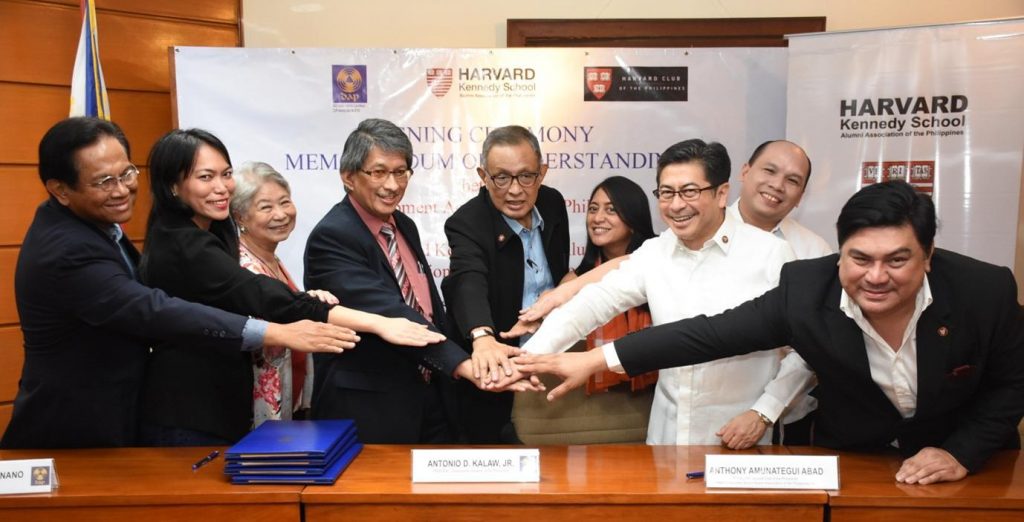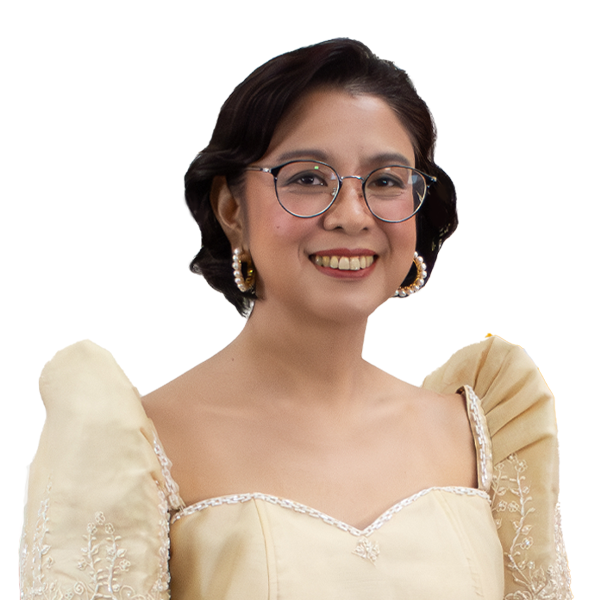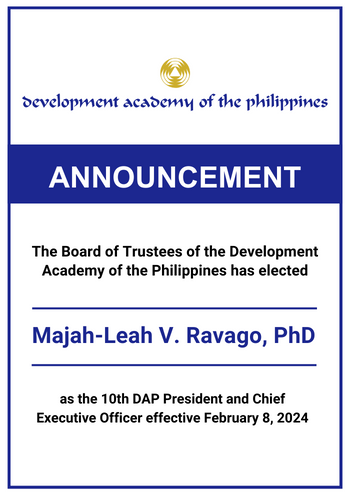
Officials of the Development Academy of the Philippines and Harvard Kennedy School Alumni Association led by DAP President Antonio Kalaw Jr. and HKSAAPI President Anthony Amunategui Abad (fourth from left and third from right, respectively) join hands in a symbolic act after the signing of a memorandum of understanding between the two organizations that would develop educational cooperation, establish collaboration and forge cooperation in developmental activities between them. (Photo by Ped Garcia)
The Development Academy of the Philippines has entered into a partnership with the Harvard Kennedy School Alumni Association of the Philippines, Inc. in a tieup that is expected to open new doors for the DAP in its mandate as a government research and training institution.
The partnership, which was forged with the signing of a memorandum of understanding between the two groups last February, is aimed at developing educational cooperation between them, establishing collaboration among organizations, and forging cooperation in developmental activities of mutual interest through such activities as joint projects, organization of lectures, symposia, conferences and workshops as well as exchange of expertise, including the engagement of the Harvard Club of the Philippines, the group of Filipino Harvard alumni.
DAP President Antonio Kalaw Jr., who led the signing of the MOU along with his counterpart from the HKSAAPI, Atty. Anthony Amunategui Abad, also president of the HCP, thanked the HKSAAPI and said that the DAP is not like state universities that are more theory-oriented as the DAP combines theory and practice, utilizing a system of “professional education” where action plans and projects as well as reentry plans, instead of a thesis, are required of students. It is a system, he said, that is geared towards making them “think outside the box” while doing research, generating ideas, and introducing and managing changes
Priority roles
Since the DAP’s priority roles are research and training, its partnership with the HKSAAPI, he said, will open new doors for it to further enhance its knowledge of the innovations in learning and the advances in research. This is because the HKSAAPI has a rich resource of human capital with whom the DAP can connect, engage in mutually beneficial activities, and share in the agency’s commitment to public service.
Kalaw cited the role that the Institutional Marketing Center played in forging the partnership with the HKSAAPI, saying that the group led by its Managing Director Merliza Makinano has the mission of creating synergies and partnerships with individuals and institutions as the DAP tries to achieve its vision of producing “global citizens” while learning from others and sharing its own expertise and experiences with a global audience.
Abad, meanwhile, said that changes are needed for people to improve their lives. He said that such improvement has not happened because the right system is not in place, especially at a time when the world is getting smaller because of technology.

Agent for change
“I think that’s why we have to work on changing the system already. (The) DAP could be a (greater) agent for change,” Abad said. “When you say you’re developing the professional public service, it’s something that is very important. (But) we tend to neglect and take for granted that public service is part of an economic system. Now one area that we really have to fight for is the change in the economic system.”
The Harvard alumnus then pointed out that with the country being dominated by monopolies and cartels, it has a closed economy that restricts popular participation. He batted for an open economy that would allow the free flow of capital and see the whole venture capital funding coming into the Philippines.
Abad also gave an inkling of what the partnership between his group and the DAP can work on, talking about the political system that can work in the Philippines. He said that a presidential unitary system “has not served us well” because of patronage and the “intermingling of the levels of where… the professional service and the political service begin.” He said it is a system where political leaders “can put (their) people as deep as possible” in the bureaucracy.
Insulated from politics
But he said that can be checked in a proper parliamentary system, where Ministers are separated from Secretaries and where the bureaucracy, the (director generals), and the directors are insulated from the political party in power at a certain time. “When you start creating federal bureaucracy and states, then there’s so much room for improvement. That’s where (the) DAP can come in,” Abad said.
He cited what he called two other “realities” that his group and the DAP can work on – the country’s relationship with the United States based on the country’s need for global positioning and that with the Association of Southeast Asian Nations as a member of the regional community. “These are the realities that we begin with and talk about systems design (for) and all that. So this is just the beginning. The first three plates are going to be served as scheduled, and beyond that, there will be a whole buffet that we have to offer,” Abad said.
The HKSAAPI is a non-stock, non-profit organization of Harvard Kennedy School alumni that aims, among other goals, to “promote, develop and strengthen the ideals of public service, leadership, honor, and integrity” inculcated at the school; and “organize, sponsor and provide assistance for research studies, conferences, seminars, and dialogues relating to developmental policy, issues and alternatives,” with special focus on public policy issues in the context of Philippine development.




